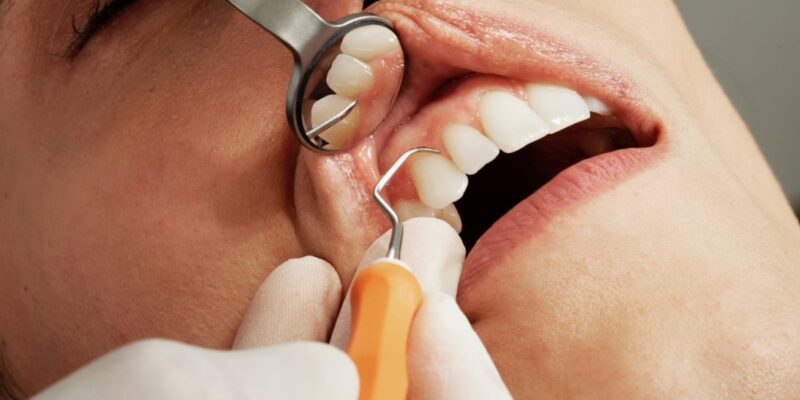Do you find your gum bleeds a lot when you brush? Are you wondering why? If you are researching about gum bleeding in south jersey, you should check this article.
Based on the questions we had from our patients for past 5 years, we wrote this article to provide more information about gum bleeding.
Call us at 856-829-8668 if you have any questions. Rapha Dental is Family Dentist in South Jersey.
What is normal color of gum? Is gum bleeding normal?

Normal color of gum should be pinkish color. If it looks red or bleeds, that usually means inflammation of gum called “gingivitis.” So, bleeding of gum is not normal. For some people, the color of gum may be dark pink and can even have black pigmentation.

Dark color of gum is normal and you do not have to worry about it.
Sometimes, you can even see a pattern and that’s not a sign of disease. Some people can have them genetically.
What should I do when I have gum bleeding?
Gum bleeding can be an inflammation of gum (Gingivitis) or it can be something more serious called “Periodontitis.” The difference between those two is whether you have an “attachment” loss or not.
First thing you need to do is make an appointment for dental exam and evaluation. If it is gingivitis, regular dental cleaning and home oral hygiene care may be good enough. If it is periodontitis, you need more advanced treatment to treat the disease.
Do you remember dentist or dental hygienist calling out numbers during the exam as they poke around your gum? It is examination procedure called “Periodontal Probing.” It is to measure whether you have an attachment loss around teeth or not. Take a look at this diagram.

Do you see the number? When you have plaque & calculus around the teeth for extended period of time, bacteria around them causes inflammation. And inflammation cause the loss of attachment between tooth and bone. 2~3 mm probing depth is normal and if it goes 5mm or more, you have periodontal disease.
Can I just brush teeth really well at home?
Brushing your teeth well and have good oral hygiene is very important. However, calculus (tartar) around teeth is very hard to remove. Once they are formed around teeth, it’s hard even for the professionals to remove them with dental equipment. We use ultrasonic device to break them and also uses stainless steel scalers.
Let’s take a look at the photo to see how calculus looks like above gum.

And if they are formed underneath the gum for periodontal disease cases, you cannot even reach them. It is so hard even for dental professionals, we cannot clean your mouth at one visit. It requires 2 visits. For advanced periodontitis, it requires referral to gum specialist called Periodontists.
But I don’t feel any pain. I feel just fine.
You do not have pain from the gum disease until it’s too late. If periodontitis is advanced, it will generate infection around the teeth and causes toothache. Your teeth will become mobile and will hurt when you chew something. There isn’t much dentists or periodontists can do when that happens other than extracting teeth. Periodontitis is not localized on couple of teeth, it usually affects the whole area or full mouth.
The earlier the better
Even with treatment, it is difficult to reverse bone loss after the attachment loss caused by disease. The best we can do is to maintain it and prevent further bone loss. So, it is better to intervene earlier than later. If you try to treat it later, you may have to see specialists or even need multiple implants and extraction. They are much more costly. By postponing treatment to save money, you may end up spending much more. We always tell patients that the best way to save money from dental visit is to keep your routine checkup appointment and treat the disease early.
Is there anything I can do at home?
There is not much you can do if you have periodontitis because you cannot really reach there yourself at all.
If you are at gingivitis status, here’s a few helpful tips from American Dental Association.
Rapha Dental is your Family Dentist in South Jersey
If you are having problems with gum bleeding in south jersey, Give us a call at 856-829-8668. You can make an appointment online as well.
We should treat it sooner than later!

